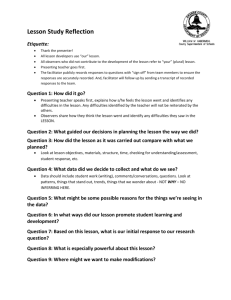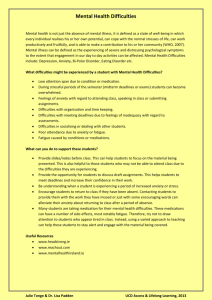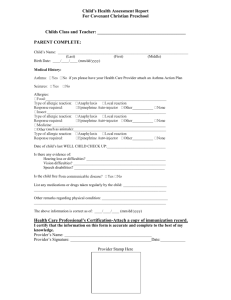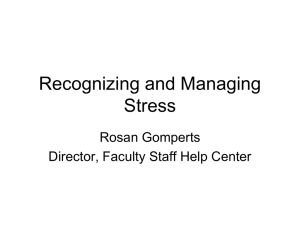Students with Mental Health Difficulties
advertisement
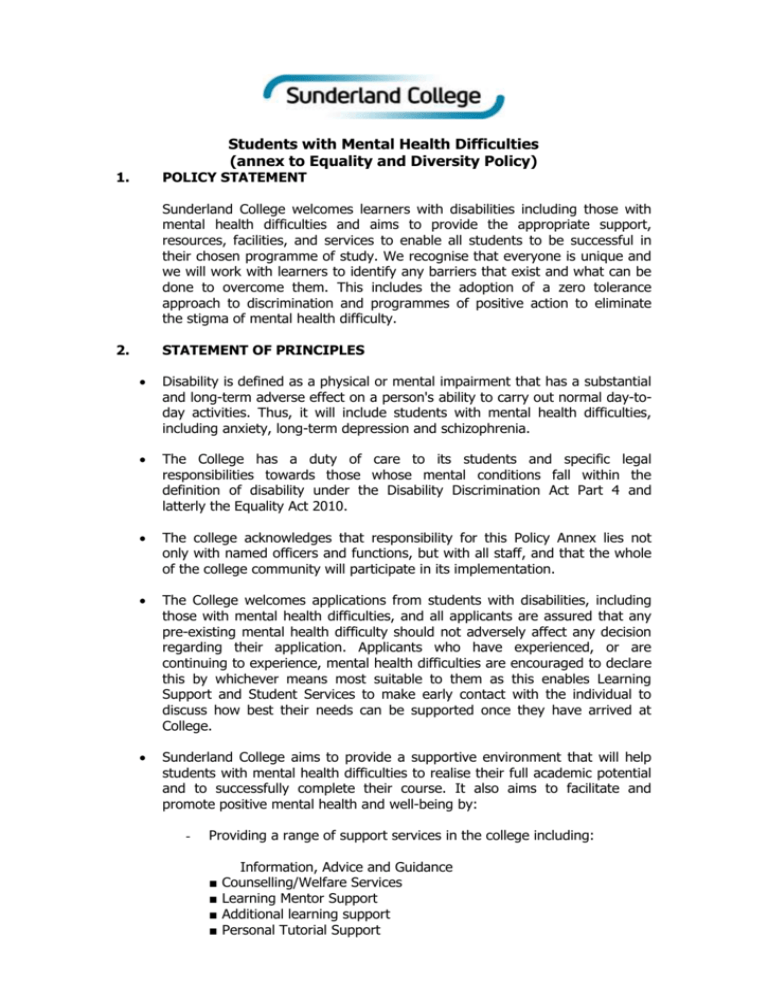
Students with Mental Health Difficulties (annex to Equality and Diversity Policy) 1. POLICY STATEMENT Sunderland College welcomes learners with disabilities including those with mental health difficulties and aims to provide the appropriate support, resources, facilities, and services to enable all students to be successful in their chosen programme of study. We recognise that everyone is unique and we will work with learners to identify any barriers that exist and what can be done to overcome them. This includes the adoption of a zero tolerance approach to discrimination and programmes of positive action to eliminate the stigma of mental health difficulty. 2. STATEMENT OF PRINCIPLES Disability is defined as a physical or mental impairment that has a substantial and long-term adverse effect on a person's ability to carry out normal day-today activities. Thus, it will include students with mental health difficulties, including anxiety, long-term depression and schizophrenia. The College has a duty of care to its students and specific legal responsibilities towards those whose mental conditions fall within the definition of disability under the Disability Discrimination Act Part 4 and latterly the Equality Act 2010. The college acknowledges that responsibility for this Policy Annex lies not only with named officers and functions, but with all staff, and that the whole of the college community will participate in its implementation. The College welcomes applications from students with disabilities, including those with mental health difficulties, and all applicants are assured that any pre-existing mental health difficulty should not adversely affect any decision regarding their application. Applicants who have experienced, or are continuing to experience, mental health difficulties are encouraged to declare this by whichever means most suitable to them as this enables Learning Support and Student Services to make early contact with the individual to discuss how best their needs can be supported once they have arrived at College. Sunderland College aims to provide a supportive environment that will help students with mental health difficulties to realise their full academic potential and to successfully complete their course. It also aims to facilitate and promote positive mental health and well-being by: - Providing a range of support services in the college including: ■ ■ ■ ■ Information, Advice and Guidance Counselling/Welfare Services Learning Mentor Support Additional learning support Personal Tutorial Support ■ Referral to relevant external agencies such as NHS provision or Voluntary Service - - Meeting the support and study needs of students with mental health difficulties Encouraging students with mental health difficulties to seek support Promoting, via staff development, an understanding and recognition of mental health difficulties by staff Identifying Learning Support Directorate staff to lead on Mental Health (i.e. Disability Advisor – Mental Health; Lead Mentor – Mental Health Promoting awareness of Mental Health issues such as stigma through college wide events and projects in line with National and International developments (e.g. World Mental Health Day) Providing guidance and training to staff involved in the support and care of those with mental health difficulties Providing clear guidance on the confidentiality of personal information provided by students. Ensuring that the sources of support are clearly communicated to both prospective and current students Establishing consistent procedures across the College for helping students with mental health difficulties Establishing effective procedures for helping students in crisis. Helping Students in Crisis - There may be occasions when a student's behaviour causes concern in which urgent action is required. In such cases, the Director of Learning Support should be contacted. In an emergency, he/she will assess the situation and will contact the appropriate agencies. Assessment under the Mental Health Act may be required. - It may be the case that a psychiatric assessment is needed in order to establish whether it would be appropriate for the learner to continue with her/his studies or would benefit from some time out of the college. If the student has insight into their condition and is prepared to accept help, a referral will usually be made to the local Mental Health Team via the student's GP (family doctor). It is important that students with mental health difficulties can feel assured that any information they provide will be treated as confidential and that it will not harm their academic standing. All staff are required to observe confidentiality in accordance with the Data Protection Policy and the requirements of the Disability Discrimination Act. The aim of this policy annex is to have a clear and transparent mechanism for communicating information to those who need to know about a student's disability and is based upon obtaining the student's written informed consent to disclosure. Some students, however, will choose to withhold their consent and it is always important to respect a student's right to confidentiality. However, confidentiality can become an issue if there are real concerns about a student's well being. It is acknowledged that disclosure without consent can be justified in the public interest to either: a) prevent serious harm, b) to aid in the prevention or detection of a serious crime. (In all cases students will be informed in advance that disclosure may be necessary if they or others are considered to be at risk of harm - unless this in itself may cause harm) 3. EXPLANATION OF KEY TERMS 3.1 Mental Health Difficulties Signs and Symptoms The term mental health difficulty encompasses a range of conditions. Mental health can be viewed most usefully as a continuum of experience from wellbeing through to a severe and debilitating long-term illness. Mental health difficulties can present in a wide variety of ways, depending on the individual, and changes in people's mood and personality can provide important indicators, although clearly it is not possible to make such a comparison when dealing with someone for the first time. The terms listed below, whilst not exhaustive indicate some common forms of Mental Health difficulties: - Anxiety; Agitation, disturbed sleep pattern, significant changes in appetite, headaches, digestive difficulties, panic attacks - Depression; Low mood, lack of motivation, sense of emptiness, withdrawal, change of appetite, self neglect, self loathing, thoughts of hurting or killing oneself. - Mania; Elated mood, rapid speech, little sleep, relentless high energy, reckless behaviour, delusions or hallucinations. Mania with depression forms bi-polar disorder which is characterised by unstable behaviour patterns and mood swings. - Schizophrenia; Disordered thoughts, loss of contact with reality, hearing voices, hallucinations, the person believing that others are controlling their thoughts or actions, loss of emotional experience or paranoia. - Psychosis; Schizophrenia is the most common 'psychotic condition', a broad term used when the person loses contact with reality. Other conditions, such as anxiety, depression and mania can manifest some psychotic symptoms if sufficiently intense. - Anorexia Nervosa; An eating disorder characterised by extreme fear of being fat, distorted body image, extremely low dietary intake, excessive exercise. - Bulimia; An eating disorder characterised by binge eating, induced vomiting, induced diarrhoea. Obsessive-Compulsive Disorder Repetition of behaviours, rituals, checking, ruminating, repetitive thoughts. - Panic Disorder; An abrupt surge of intense anxiety manifested through breathing difficulty, palpitations, feelings on unreality, pains or tightness in the chest, trembling, dizziness, feeling unsteady, sweating, feeling faint, a fear of losing control or even of dying, tingling in hands and feet. - Phobias; Intense fear, usually with one focus such as heights, rats, spiders, social situations. - Post Traumatic Stress Disorder; A prolonged, abnormal and often delayed response to events such as a personal assault or natural disaster. Symptoms include anxiety, insomnia, detachment. - Self-harm; can include cutting, slicing, burning, bumping into walls/doors, pulling of hair. Some students always wear long sleeves. 3.2 Disability Related Discrimination – is defined as less favourable treatment of a disabled person for a reason relating to her/his impairment or condition. For example a student with a mental health difficulty is told she must not carry medication with her at college because of a strict policy that does not allow drugs on the premises. 3.3 Impact Assessment – refers to a detailed and systematic analysis of the actual or potential effects of a formal or informal policy, proposed policy, practice, procedure or process to determine whether it has a differential impact upon identifiable groups of people. 4. COLLEGE PROCEDURES 4.1 Help and Support Services (Mental Health Difficulty/Welfare) Counselling/ Welfare Services: Staff in the Counselling team provide a free and confidential service to all students. Learners are offered an interview where problems and possible therapy options are discussed. Issues can range from academic difficulties, through emotional, sexual, family and mental health concerns as these arise during the stresses of transition and re-adjustment in student life. Appropriate referral procedures exist with external referral agencies. The Disability Advisor Team (DAT) The DAT provides services for students with all disabilities including those with mental health difficulties. It exists to provide assessment and support and to advise other college staff on how to support such learners. The DAT assesses students' study strategies in relation to their needs and makes recommendations as to how they can be supported through the use of assistive technology, as well as by non- technical means such as learning support. It can offer support to learners in a number of ways: Additional Learning Support For students who require additional support with their studies, the Additional Learning Support team offers a range of provision. Students can receive extra teaching support in class, or in smaller groups. Learners can make an appointment for a one-to-one meeting to discuss their study difficulties, their lecturer or tutor may refer them, or they may self-refer. Individual learning support with specialist tutors can also be arranged in certain cases. Through the services of the Educational Psychologist the DAT offers advice, screening and formal assessment for students who may have specific learning difficulties (dyslexia) and may also help in identifying particular learning needs and suggest strategies to deal with them. Evidence from a GP, psychiatrist, CPN or registered therapist can help with the identification of Special Exam Access Arrangements, which may be appropriate for students with mental health difficulties, such as extra time or separate invigilation. Learning Mentor Support Provides the services of Mentors who work with individuals who have emotional and behavioural difficulties and can assist students who have personal care and mobility needs. Mentor staff can also act as a point of contact for individuals who may be experiencing anxiety whilst at college. 4.2 Advice to staff on Mental Health issues: Many students with mental health difficulties, or illnesses, have effective coping strategies and support already in place; they may not need or wish to seek adjustments or additional support. Typical age of onset means a number of students first experience mental health difficulty at college. It may be through discussion with tutors or teaching staff that the support needs of students first emerge or via the Disability Advisor Team or Counselling/Welfare Service. It is possible that the learning process will be interrupted if a person is experiencing mental health difficulties. The warning signs may include difficulties in meeting deadlines, failure to attend classes or tutorials and a noticeable decline in the quality of the work handed in. It may often be the case, therefore that the first person to become aware of developing mental health difficulties will be a personal or course tutor. Students concerned about a fellow-student’s behaviour may also approach staff. Staff may find themselves in a situation in which it is necessary to work out what they can realistically offer on the spot. It may help to be aware that not all students experiencing difficulties, even relatively severe, need any action to be taken beyond: - Understanding and sensitivity - Tolerance of difference - Awareness of activities which may heighten anxiety for a particular student - Trying to create a climate of acceptance among fellow students without compromising confidentiality. For some students there will be specific actions which academic staff can take: - Flexibility in dealing with interruptions to study, impaired concentration or attendance - Discussing confidence building strategies with students who are particularly anxious about for e.g. seminar presentations - Making allowances for mood swings - Accepting that some students may need to sit in a particular place near an exit, or that they may have to leave unexpectedly - Allowing that students whose concentration is impaired may use notetakers in lectures. Most importantly, tutors should never give advice that is not within the boundaries of their role. It is essential to remember that as an educational establishment our duty is to support the Student and NOT to solve mental health difficulties. Tutors should listen and encourage the student to seek the appropriate help, possibly via the college Counselling/Welfare service. It is important to recognise what can realistically be done and whether there is a more appropriate person to deal with the problem, the first point of referral would normally be the Director of Learning Support. The Head of Division, Student Support or Director of Learning Support should discuss their concerns with the student and attempt to establish an initial understanding of the student's own perceptions of their situation. Where possible, an action plan should be agreed as a result of the interview. This may mean actively encouraging the student to access internal support through the Counselling/Welfare Service, Disability Advisor Team or their GP. There may also be practical issues to address such as financial hardship, or a need for learning support or a change in accommodation. 5. MONITORING The implementation of this policy annex will be monitored by the Governing Board on an annual basis. Appropriate data will be provided to the Governing Board, including numbers of complaints/incidents in relation to Mental Health Difficulty. This policy annex - Student with Mental Health Difficulties - should be read in conjunction with the college Equality and Diversity Policy the college’s Equality Objectives and the college Strategic Plan. 6. HAS IMPACT ASSESSMENT TAKEN PLACE - Yes 7. REVIEW DATE AND BY WHOM December 2011 Joe Leggett
